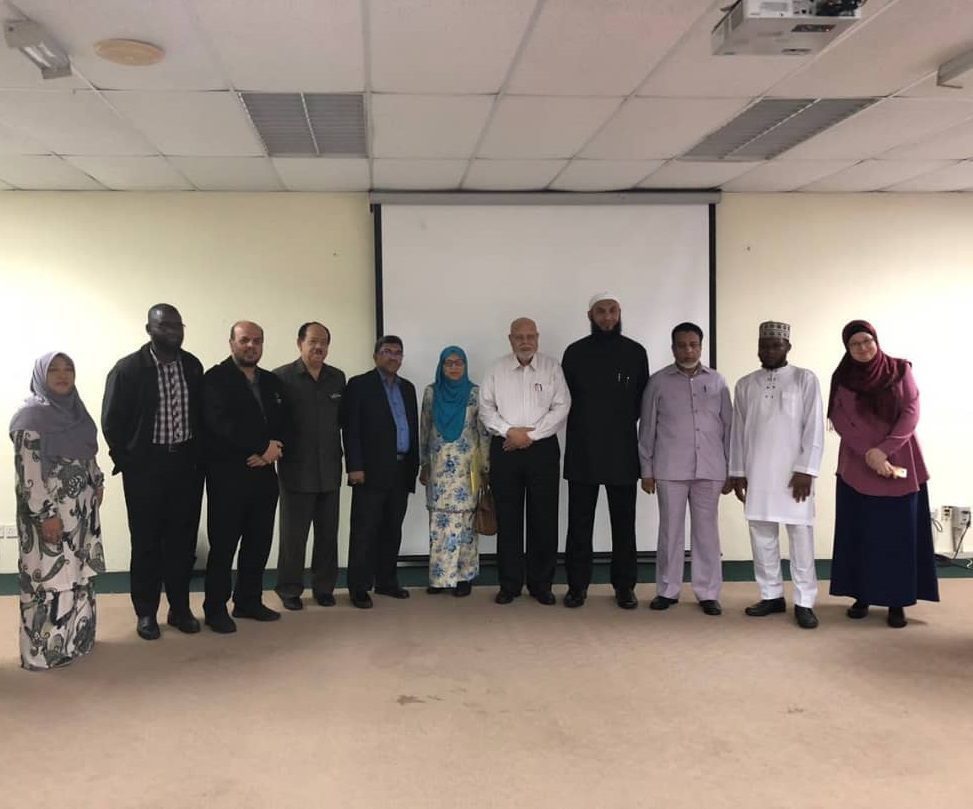By Mohammad Saifullah
GOMBAK, 3 October 2018: A visiting professor from University of South Australia has urged for the advancement of the Islamic Studies course curriculum following a dialogue session with lecturers of Kulliyyah of Islamic Revealed Knowledge and Human Sciences (KIRKHS).
Professor Dr. Mohamed Abdalla shared his views with lecturers of KIRKHS about Islamic Studies curriculum and expressed opinion for the betterment of Muslim youth education. The dialogue session was held at HS Seminar Room on Tuesday (2 October).
In the dialogue session, Abdalla spoke about his centre called “Centre for Islamic Thought and Education” at the University of South Australia.
Sharing his experience about the condition of Australias Islamic Education, Abdalla highlighted problems he faced while teaching the youth on Islam.
He said: “Especially, the post 9/11 for the minority Muslim Australians it became so difficult to utilise Islamic studies because of the media. Whenever you turn on the television or go to newsfeed Islam, the Muslim community and Muslim culture are found to be negatively bombarded and misrepresented. The young Muslim women or men born in the last 15 years grow up in an environment constantly criticised over their faith and culture. When they feel Islamic civilisation has nothing to contribute and because of the disease of the radicalisation and extremism, young Muslims began to question about their faith. Therefore, identity has become an issue.”
He asked, how are we going to resolve that problem? How do you utilise our tradition and revealed knowledge?
œIn order to demonstrate convincingly and intellectually that there are no incompatibilities between being Muslims and being Australians, our tradition and civilisation are strongly regarded.”
“We are facing another problem that is, the students in Islamic school are good in all academic subjects, but they are weak in Arabic and Islamic studies regardless of countries such as Australia, UK, USA and in Canada. œ
“We have conducted a research on Islamic schools, about 400 students, we found that the young Muslim students told us, we love to know about Islam, but we have problem with the content. They are saying, the way Islam is teaching them is boring and repetitive. The meaning here is that the contents of teaching in primary school is repeated is High school. But it does not repeat when we learn physics and chemistry, every class there is a new lesson.
œThe way you teach us is irrelevant to our mind and biased because the teachers want to impose their own view to the students and when we look for the solution on the internet, there are many views about one matter, and that breaks the relationship between teacher and students. They cannot maintain their trust in the teachers, the students expressed.
However, Abdalla said, “There are no big studies about this matter, how can we utilise our tradition and revealed knowledge? The students in the Islamic school of Australia are facing another problem with the Arabic language, the highest dropout on a subject is Arabic language and the problem is that they do not find any interest to learn Arabic. The students argued that the teachers are not trained, with curriculum that is outdated, outdated method of teaching and the pedagogy is not suitable.”
Abdulla stressed that there is the need to find an acceptable way of teaching that is suitable for the students, “the way we engage with the students need to be developed”.
“We need to show that Islam is in intelligence and it has the solution. Can you imagine if we are able to do that what will be the result, thousands of students with Arabic background will bring a new success for us?”
Meanwhile, in the dialogue session, Assoc. Prof. Dr. Mohamed Mumtaz Ali from the Department of Usul al-Din and Comparative Religion shared his view on the curriculum of IIUM. He said, œI can never finish my courses because I found my students not highly engaged with the course, but they have many questions to answer.”
œThat is why we need to inform the students about the objective of the course such as for UNGS courses. We need to train the teachers to deliver using suitable method of teaching, he added.
Assoc. Prof. Dr. Shukran Abd. Rahman from the Department of Psychology shared the same view with Dr. Mumtaz Ali and said that some of his students claimed that they do not find any interest in Arabic language and they expect to change the curriculum.
Finally, Abdalla wished to work on a collaboration with IRKHS scholars for the betterment of Islamic Education and for the betterment of the Muslim community. ***
